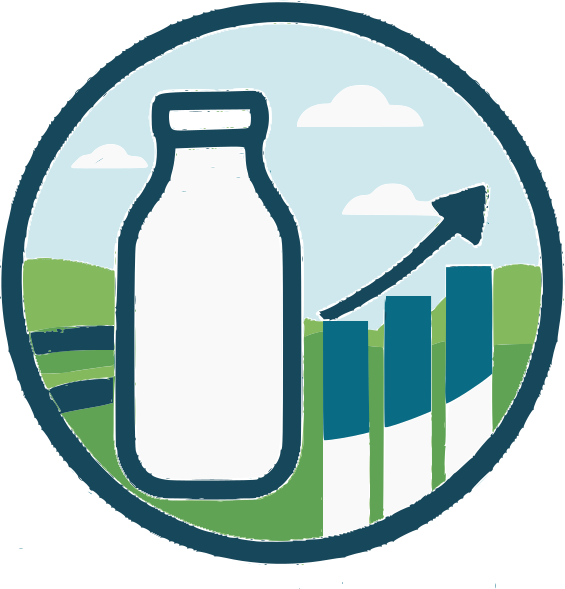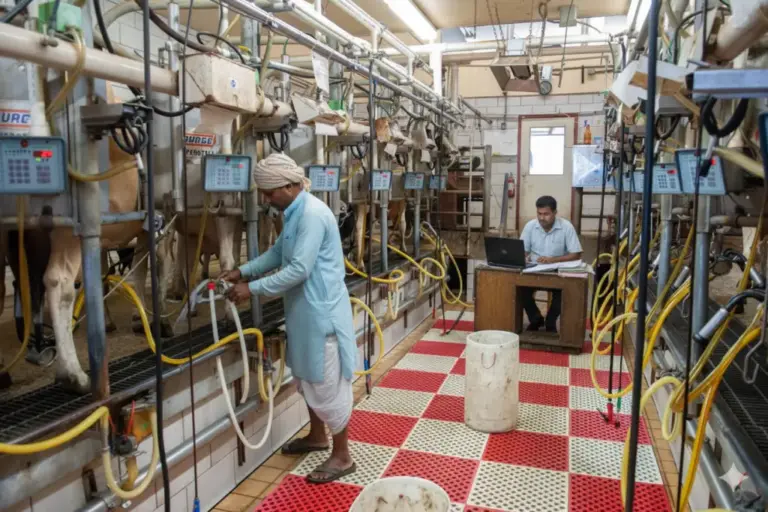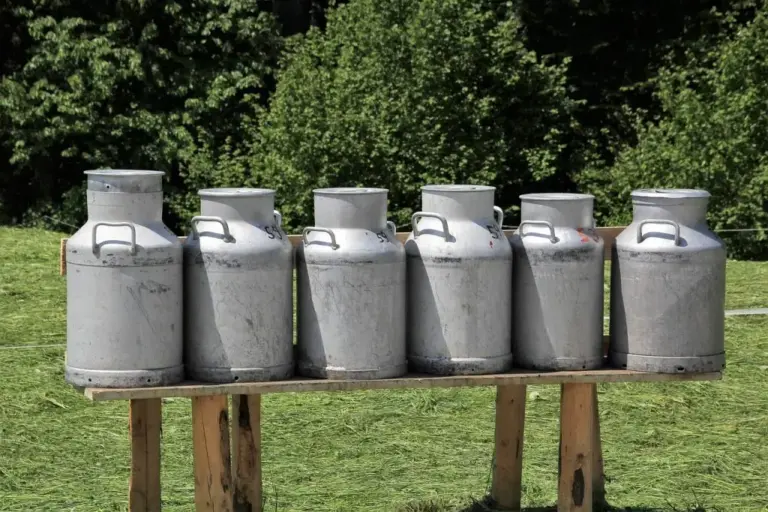How Dairy ERP Software Ensures Milk Quality and Safety
From Farm to the Fridge: The journey from farm to fridge is more complex than most consumers realize. For dairy industry owners, this journey represents a critical chain of quality control, safety protocols, and operational efficiency that directly impacts both profitability and brand reputation. A single misstep in temperature control, contamination prevention, or traceability can result in costly recalls, regulatory penalties, and irreparable damage to consumer trust.
Modern dairy operations face mounting pressure to deliver consistently high-quality products while managing increasingly complex supply chains, stringent regulatory requirements, and razor-thin profit margins. The solution lies in comprehensive dairy ERP software that transforms traditional milk processing into a fully integrated, automated operation that ensures quality at every step.
The Modern Dairy Supply Chain Challenge
Today’s dairy industry operates in an environment where consumers demand transparency, regulators enforce stricter safety standards, and competition drives the need for operational excellence. The traditional approach of manual tracking and paper-based systems simply cannot keep pace with these demands.
Consider the typical milk journey: from the moment a cow is milked to when that milk reaches a consumer’s refrigerator, it passes through multiple stages including collection, testing, processing, packaging, distribution, and retail. Each stage presents potential quality risks and requires meticulous documentation for regulatory compliance and traceability purposes.
Without dairy ERP software, operators often struggle with disconnected data, manual processes prone to human error, and delayed identification of quality issues. This fragmented approach not only compromises product safety but also creates operational inefficiencies that directly impact profitability.
How Dairy ERP Software Transforms Quality Management
Comprehensive dairy ERP software serves as the central nervous system of modern dairy operations, connecting every aspect of the milk journey through integrated digital workflows. This specialized software eliminates information silos, automates critical processes, and provides real-time visibility into quality metrics that matter most to your bottom line.
The transformation begins with data integration. Instead of managing separate systems for production, quality control, inventory, and compliance, dairy ERP software unifies all operations under a single platform. This integration enables automated workflows that respond instantly to quality deviations, temperature excursions, or regulatory requirements.
More importantly, dairy ERP software shifts operations from reactive to proactive quality management. Rather than discovering problems after they occur, integrated systems identify potential issues before they impact product quality or customer satisfaction.
Real-Time Testing and Quality Assurance Integration
Laboratory testing forms the backbone of dairy quality assurance, but traditional testing workflows often create bottlenecks that delay production decisions and increase holding costs. Modern dairy ERP software revolutionizes this process through seamless laboratory information management system (LIMS) integration.
When milk samples arrive at the laboratory, the dairy ERP software automatically generates testing protocols based on predetermined quality parameters, regulatory requirements, and customer specifications. Test results flow directly into the production planning system, triggering automated decisions about batch release, rejection, or rework.
This integration eliminates manual data entry errors and reduces the time between testing and production decisions from hours to minutes. For dairy operators, this translates into reduced holding costs, faster inventory turnover, and improved cash flow. The software maintains complete audit trails of all testing activities, ensuring regulatory compliance while minimizing administrative burden.
Advanced dairy ERP software also enables predictive quality management by analyzing testing trends and identifying potential issues before they impact production. This proactive approach helps dairy operators maintain consistent quality while reducing waste and maximizing yield.
Complete Batch Traceability: From Source to Shelf
Traceability represents one of the most critical aspects of dairy quality management, yet it remains one of the most challenging to implement effectively. Regulatory agencies require complete forward and backward traceability, while consumers increasingly demand transparency about product origins and processing methods.
Dairy ERP software creates comprehensive digital twins of every milk batch, tracking its journey from farm collection through final product delivery. This traceability begins at the farm level, where the system records collection details including farm identification, collection time, temperature readings, and initial quality assessments.
As milk progresses through processing, the dairy ERP software maintains continuous batch genealogy, tracking how raw materials combine into finished products, which processing equipment handles each batch, and how products split or merge during packaging operations. This granular tracking enables instant recall capabilities that can isolate affected products to specific production runs, minimizing financial impact and protecting brand reputation.
The business benefits extend beyond regulatory compliance. Complete traceability enables dairy operators to implement premium pricing strategies for specialty products, verify organic or sustainable sourcing claims, and provide customers with detailed product information that builds brand loyalty and trust.
Temperature Control and Cold Chain Management
Temperature control represents perhaps the most critical factor in maintaining milk quality throughout the supply chain. Even brief temperature excursions can compromise product safety, reduce shelf life, and create costly quality issues. Traditional temperature monitoring relies on manual checks and paper-based records that provide limited visibility and delayed problem identification.
Integrated dairy ERP software transforms cold chain management through continuous monitoring and automated response capabilities. IoT sensors throughout the facility provide real-time temperature data that flows directly into the software, creating comprehensive temperature histories for every product batch.
When temperature deviations occur, the dairy ERP software immediately alerts quality managers and can automatically trigger corrective actions such as adjusting refrigeration systems, rerouting products, or initiating quality investigations. This immediate response capability prevents minor deviations from becoming major quality issues.
The financial impact is substantial. By maintaining optimal temperatures throughout processing and storage, dairy operators reduce product losses, extend shelf life, and minimize customer complaints. The software’s detailed temperature records also provide definitive documentation for insurance claims and regulatory inquiries.
Maximizing Revenue Through Operational Excellence
The ultimate goal of any dairy ERP software is not just quality assurance but profitable growth. By integrating quality management with operational planning, these systems help dairy operators identify opportunities to maximize revenue while maintaining safety standards.
Advanced planning capabilities consider quality parameters alongside production capacity, enabling operators to optimize product mix based on available raw materials and market demand. The dairy ERP software can automatically adjust production schedules to prioritize high-margin products when premium-quality milk is available, or shift to commodity products when quality parameters suggest standard processing approaches.
Quality data integration also enables value-based sourcing strategies. By tracking quality metrics from individual farms or suppliers, dairy operators can implement premium payment programs that incentivize higher quality raw materials while building stronger supplier relationships.
Implementation Success: Building Your Quality-Focused Future
Successful dairy ERP software implementation requires a strategic approach that prioritizes quality management integration from day one. The most successful implementations begin with clear quality objectives and work backward to identify the system capabilities and integrations required to achieve those goals.
Start by mapping your current quality processes and identifying the biggest pain points that impact profitability. Whether it’s excessive testing delays, incomplete traceability, or temperature control issues, focus your dairy ERP software selection and implementation on addressing these critical challenges first.
Remember that technology alone cannot guarantee quality – it must be supported by proper training, clear procedures, and a culture that values continuous improvement. The most successful dairy operators view ERP software implementation as an opportunity to transform their entire approach to quality management, not simply to automate existing processes.
Conclusion: Your Path to Dairy Excellence
The modern dairy industry demands operational excellence that balances quality, safety, and profitability in ways that were impossible with traditional management approaches. Comprehensive dairy ERP software provides the integration, automation, and visibility required to meet these demands while building sustainable competitive advantages.
From automated testing workflows that reduce costs and improve accuracy, to complete batch traceability that protects your brand and enables premium positioning, to integrated temperature management that preserves product quality and maximizes shelf life – dairy ERP software transforms every aspect of dairy operations.
The question facing dairy industry leaders is not whether to implement integrated quality management systems, but how quickly they can realize the competitive advantages these systems provide. In an industry where quality directly impacts profitability and brand reputation, comprehensive dairy ERP software represents essential infrastructure for future success.




